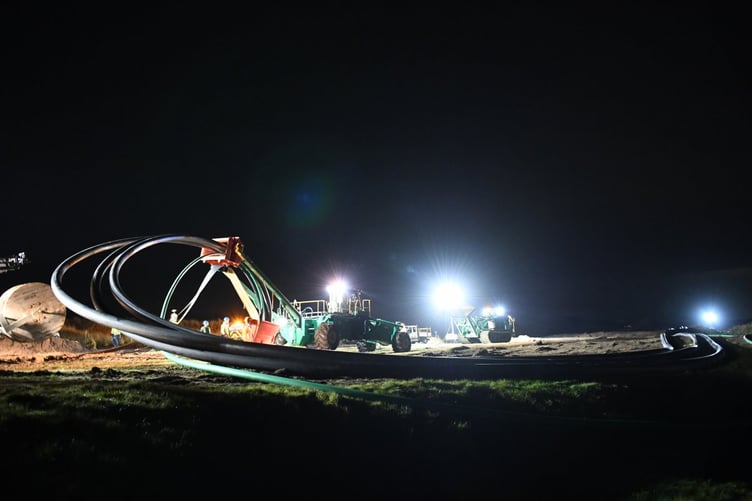POLITICIANS are calling for a re-think on plans to install electricity pylons through mid and west Wales - saying a local company has the solution.
Plans to install pylons across Carmarthenshire and Ceredigion are causing great concern to local communities, who have staged public meetings in recent months.
The plans, if they go ahead, will see a series of pylons up to 27m high, carrying 132kV overhead lines from the proposed Lan Fawr Energy Park, located between Llanddewi Brefi and Tregaron, to a potential new National Grid substation in Carmarthen.
Speaking at a debate in Westminster, both Ceredigion MP, Ben Lake and Carmarthen East and Dinefwr MP, Jonathan Edwards, called on the UK government to consider using an innovative underground cabling technique devised by Pencader company, ATP.
Speaking at the debate, Mr Lake said: "The communities raising these concerns are not blind to the urgent need to address climate change and decarbonise our economy. "Indeed, the Welsh Government’s 'Energy Generation in Wales: 2022' report, which was published last October, details the equivalent percentage of local electricity consumption met by local renewable electricity generation for each county in Wales.
"For Ceredigion, 118 per cent of our local electricity consumption in 2022 was met by local renewable electricity generation.”

Jonathan Edwards MP said during the debate: "I am facing huge upheaval in my constituency, however, because there are now four distribution and transmission routes being proposed for Carmarthenshire.
"In Roman times, all roads led to Rome; in west Wales, all pylons lead to Llandyfaelog, where new national grid infra- structure is being built."
Both MPs asked for undergrounding to be considered and pointed to ATP.
‘Undergrounding' is used in limited circumstances, but has traditionally been deemed as too expensive.
However, recent advancements in cable ploughing techniques have significantly reduced the cost.
Green GEN Cymru is proposing a new 132kV overhead line to connect Lan Fawr Energy Park in West Wales to a new National Grid substation in Carmarthen.
As part of the initial consultation process, significant concerns were raised with several public meetings and campaign groups forming over recent months to oppose the proposals.
ATP in Pencader uses a Spiderplow technique which has a low impact on the environment.
Whilst traditional methods of pipe and cable installation require a sizable trench to be dug and then refilled, the Cable Plough's efficient way of cutting a narrow slit into the soil causes only minimum disturbance to the land, but is able to carry the required voltage and is cheaper.
Mr Edwards told the debate: “The argument for pylons is that undergrounding is far more expensive, but the new cable ploughing technology is extremely impressive. It can be used to plough about a kilometre of line a day, and it is far cheaper than traditional undergrounding.
“The technology is there.”
Mr Lake added: “We all agree that the National Grid needs upgrading. It needs strengthening, but it is disappointing that the Government has, thus far, failed to truly consider the benefits and advantages of cable ploughing techniques.”




.png?width=209&height=140&crop=209:145,smart&quality=75)
Comments
This article has no comments yet. Be the first to leave a comment.